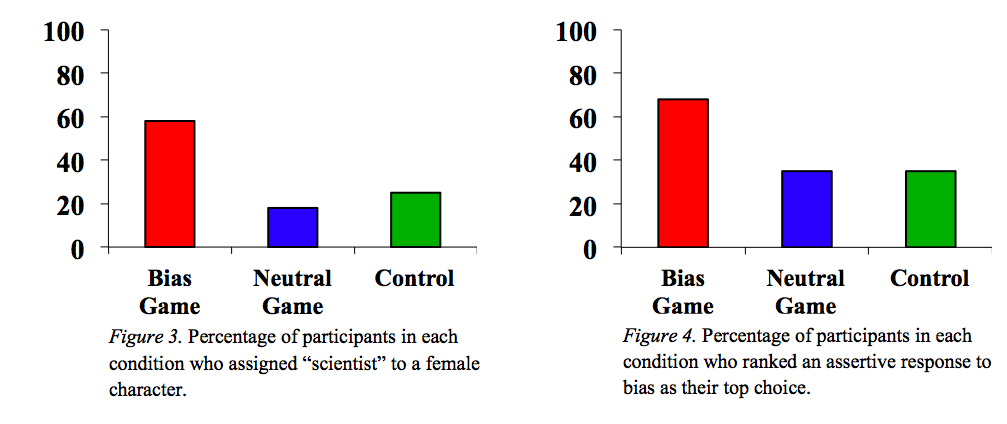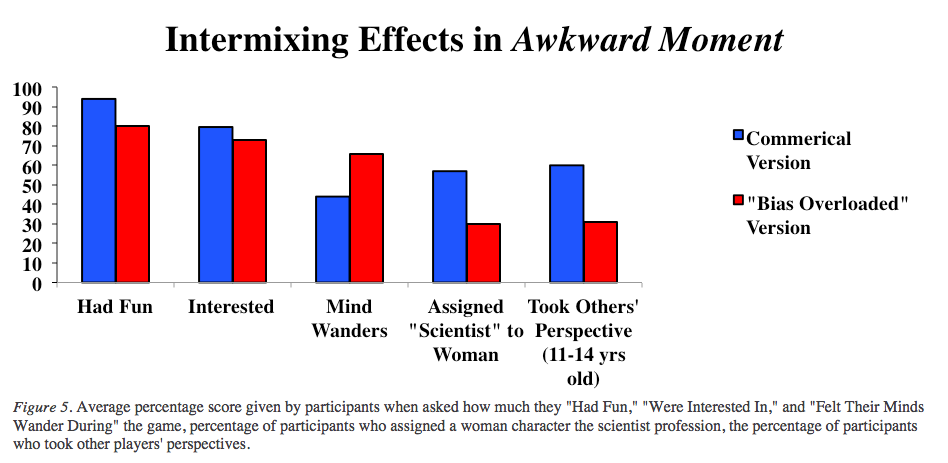Card games are more often associated with family-gatherings or leisurely afternoons than with realizing social change. However, one group of game designers is creating games with an aim to do just that.
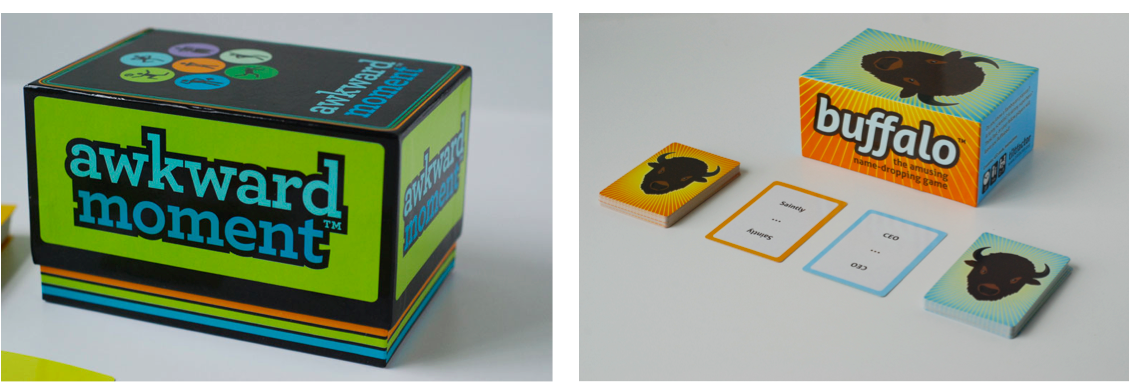 Tiltfactor Lab, a Dartmouth College research laboratory with Sherman Fairchild Distinguished Professor Mary Flanagan at the helm, is dedicated to “creating games for social change.” They designed and produce Buffalo—described by Amazon reviewers as an “extremely simple,” “adaptable” party game—and Awkward Moment—and is “an interesting, family-friendly card game that is worthy of your attention” and “makes you laugh”— provide more than just endless fun at parties. According to a paper to be printed in CyberPsychology’s upcoming issue devoted to the prosocial effects of games, Buffalo and Awkward Moment are also games with a proven purpose. These games have been shown to change players’ implicit biases without them ever knowing!
Tiltfactor Lab, a Dartmouth College research laboratory with Sherman Fairchild Distinguished Professor Mary Flanagan at the helm, is dedicated to “creating games for social change.” They designed and produce Buffalo—described by Amazon reviewers as an “extremely simple,” “adaptable” party game—and Awkward Moment—and is “an interesting, family-friendly card game that is worthy of your attention” and “makes you laugh”— provide more than just endless fun at parties. According to a paper to be printed in CyberPsychology’s upcoming issue devoted to the prosocial effects of games, Buffalo and Awkward Moment are also games with a proven purpose. These games have been shown to change players’ implicit biases without them ever knowing!
Buffalo, a name-dropping game for ages 14+, challenges players to name people who match the adjective noun pairing revealed by flipping two cards. Pairings can range from the obscure, such as an saintly + CEO (pictured above), to the familiar, such as a British + wizard, to the often forgotten, such as female + visionary. According to Kaufman & Flanagan, “just a single play session was sufficient to trigger a higher degree of change in intergroup perception and judgments among participants in the Game condition” in comparison to control groups who did not play the game. aimed at expanding its “players’’’ mental representations of numerous social categories.”

As shown in Figures 1 and 2, after playing Buffalo, students showed increased Social Identity Complexity, which is a measurement that predicts intergroup tolerance, as well as increased scores on the Universal Orientation Scale, reflecting lower prejudice and a more complex view of the inclusivity and diversity of their world. There was also an increase in Internal Motivation to Respond without Prejudice.
In short, Buffalo gameplay effectively promoted “broader and more conclusive perceptions of social groups and raised players’ concerns about their own potential biases,” according to Kaufman & Flanagan–results previously unheard of from most educational games, much less from party games.
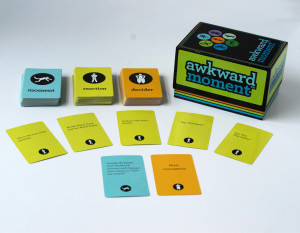 Awkward Moment, often compared to Apples to Apples in terms of game play, has been described in Amazon reviews as “a rare find” and “a blast to play.“ Blue “Moment” cards provide players with a scenario, such as “You see your friend across the street and begin waving frantically only to realize that isn’t your friend.” Orange “Decider” cards then direct the theme , such as “Most courageous,” and players play a green “Reaction” card that matches the clues, such as, “Begin a Flash Mob.” While Awkward Moment often allows players to react humorously to these awkward moments, Kaufman & Flanagan also found that it was “successful at strengthening youth players’ associations between women and science and inspiring more assertive responses to multiple forms of social bias.” To measure biases in science, technology, engineering, and math (collectively known as STEM), students were tasked with matching pictures of men and women with possible job roles.
Awkward Moment, often compared to Apples to Apples in terms of game play, has been described in Amazon reviews as “a rare find” and “a blast to play.“ Blue “Moment” cards provide players with a scenario, such as “You see your friend across the street and begin waving frantically only to realize that isn’t your friend.” Orange “Decider” cards then direct the theme , such as “Most courageous,” and players play a green “Reaction” card that matches the clues, such as, “Begin a Flash Mob.” While Awkward Moment often allows players to react humorously to these awkward moments, Kaufman & Flanagan also found that it was “successful at strengthening youth players’ associations between women and science and inspiring more assertive responses to multiple forms of social bias.” To measure biases in science, technology, engineering, and math (collectively known as STEM), students were tasked with matching pictures of men and women with possible job roles.
As shown in Figure 3, participants who played just one round of Awkward Moment matched a woman with the “scientist” job title 58% of the time, 38% more than a control group who did not play any game (Control condition) and 30% more than a group who played a Neutral Game, which did not include cards references incidents of gender bias. To study bias intervention, students were asked how they would respond to witnessing a bias incident—assertively, passively, or by trivializing the event. As shown in Figure 4, after playing Awkward Moment, 64% chose to respond assertively to bias incidents, instead of passively or through trivialization; in both the control groups, 38% cited they would respond assertively.
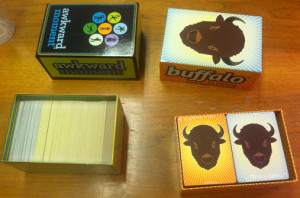 A unique feature of these games, which separates them from many other educational games, is that nowhere— not on the box or in the directions— do they mention their unparalleled ability to covertly change players’ biases. Educational game designers may note this as a flaw. However it is an integral part of Tiltfactor’s approach, supported by their findings, that obscuring the true intent of the game best supports players’ growth and enjoyment. While studying the efficacy of Buffalo and Awkward Moment Flanagan and her team found that more information isn’t necessarily better for producing a positive or prosocial effect, and, in fact the opposite; “both games’ impact rests on players not perceiving them to be overtly didactic or ‘lesson-heavy,” write Kaufman & Flanagan. They are calling their method of hiding the games’ true purposes the “Embedded Design Approach.”
A unique feature of these games, which separates them from many other educational games, is that nowhere— not on the box or in the directions— do they mention their unparalleled ability to covertly change players’ biases. Educational game designers may note this as a flaw. However it is an integral part of Tiltfactor’s approach, supported by their findings, that obscuring the true intent of the game best supports players’ growth and enjoyment. While studying the efficacy of Buffalo and Awkward Moment Flanagan and her team found that more information isn’t necessarily better for producing a positive or prosocial effect, and, in fact the opposite; “both games’ impact rests on players not perceiving them to be overtly didactic or ‘lesson-heavy,” write Kaufman & Flanagan. They are calling their method of hiding the games’ true purposes the “Embedded Design Approach.”
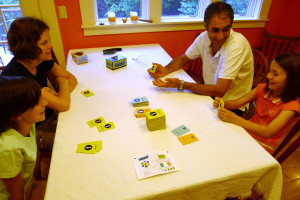 In order to prove this, the researchers studied perspective taking using a control group, the commercially available version of the Awkward Moment deck (in which roughly one third of the cards address a bias in some way), and a “bias overloaded” version of Awkward Moment (where 75% of the cards dealt with bias incidences). They found that, overall, players age 11-14 years-old found that the commercially available game was superior to the “bias overloaded” version in regards to average percent score given by participants when asked how much they “Had Fun,” “Were Interested In [the Game]”, and how often they felt their “Mind Wander” during the game, as shown in Figure 5. Also reflected in Figure 5, Kaufman & Flanagan that 11-14 years old were more likely to assign the “scientist” label to a woman and more likely to take others’ perspectives after playing the commercially available version of Awkward Moment as compared to a bias overload version.
In order to prove this, the researchers studied perspective taking using a control group, the commercially available version of the Awkward Moment deck (in which roughly one third of the cards address a bias in some way), and a “bias overloaded” version of Awkward Moment (where 75% of the cards dealt with bias incidences). They found that, overall, players age 11-14 years-old found that the commercially available game was superior to the “bias overloaded” version in regards to average percent score given by participants when asked how much they “Had Fun,” “Were Interested In [the Game]”, and how often they felt their “Mind Wander” during the game, as shown in Figure 5. Also reflected in Figure 5, Kaufman & Flanagan that 11-14 years old were more likely to assign the “scientist” label to a woman and more likely to take others’ perspectives after playing the commercially available version of Awkward Moment as compared to a bias overload version.
The authors suggest that containing less bias-related content helped make the aim of Awkward Moment covert, and lead to players rating the game as more fun and more interesting, focusing more on the gameplay, and having further decreased prejudices against women in STEM. Tiltfactor researchers found that similarly, when the message of Buffalo was overt instead of covert, the game was found to yield lower results on the Universal Orientation Scale.
According to Kaufman & Flanagan, “the results of our empirical studies involving both games attest to the efficacy of the games for decreasing players’ social biases and promoting more egalitarian, diversity-embracing mindsets among players.” Using the Embedded Design approach, which, according to Kaufman & Flanagan, aims to covertly deliver persuasive content in a “fashion that… triggers a more receptive mindset,” Tiltfactor is able to produce prosocial games that are “more engaging for a wider range of players, including both those who are sympathetic or in agreement with a particular aim or goal, as well as those who are not,” claim Kaufman & Flanagan. “These strategies may be especially effective at creating more open, expansive, and empathetic mindsets in players,” and can serve as “powerful precursors to explicit games [and lessons] that share the same persuasive goals” by providing a “balance of social & humorous elements, thus [creating] a ‘safe’ space for players to perceive and react to the game’s on-message content with greater comfort and candor,” Kaufman & Flanagan report.
 Buffalo, Awkward Moment, and Awkward Moment at Work, the follow-up adult version, are available on Amazon and soon at your local game store. Of course, you won’t find the games’ bias-fighting benefits explained on the Amazon page or written on the box–a purposeful omission proven to make these prosocial games more effective. If you do want to learn more about the games’ effects, read the full paper here or pick up the XX edition of CyberPsychology.
Buffalo, Awkward Moment, and Awkward Moment at Work, the follow-up adult version, are available on Amazon and soon at your local game store. Of course, you won’t find the games’ bias-fighting benefits explained on the Amazon page or written on the box–a purposeful omission proven to make these prosocial games more effective. If you do want to learn more about the games’ effects, read the full paper here or pick up the XX edition of CyberPsychology.
References:
Kaufman, G. & Flanagan, M. (In Print). A psychologically “embedded” approach to designing games for prosocial causes.


